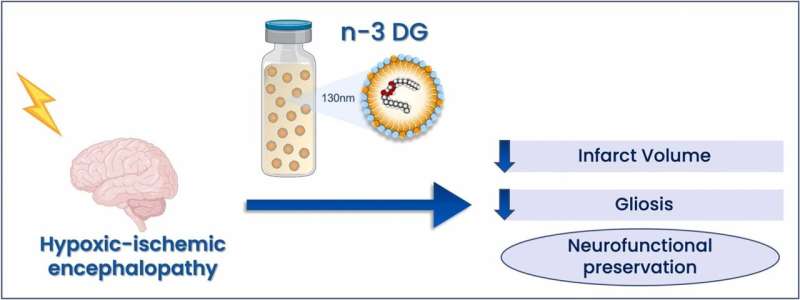This article has been reviewed according to Science X's editorial process and policies. Editors have highlighted the following attributes while ensuring the content's credibility:
fact-checked
peer-reviewed publication
trusted source
proofread
Study finds omega-3 therapy prevents birth-related brain injury in newborn rodents

An injectable emulsion containing two omega-3 fatty acids found in fish oil markedly reduced brain damage in newborn rodents after a disruption in the flow of oxygen to the brain near birth, a study by researchers at Columbia University Vagelos College of Physicians and Surgeons has found. The findings are published in the journal Biomedicine & Pharmacotherapy.
Brain injury due to insufficient oxygen is a severe complication of labor and delivery that occurs in one to three out of every 1,000 live births in the United States. Among babies who survive, the condition can lead to cerebral palsy, cognitive disability, epilepsy, pulmonary hypertension, and neurodevelopmental conditions.
"Hypoxic brain injury can have devastating, lifelong consequences, and we suggest our novel therapeutic approach using intravenous omega-3 emulsions could markedly reduce these adverse outcomes," says Richard Deckelbaum, a professor of nutrition and pediatrics and a coordinating author of the study.
The study also found that the novel omega-3 preparation is far more effective in rodents when compared to therapeutic hypothermia, the current standard therapy for this condition and the only one approved by the FDA. This treatment, which involves using cooling blankets for three days, only benefits about 15% of patients and can cause heart and respiratory complications.
"We need to find another treatment for hypoxic brain injury that will be much more effective and feasible than therapeutic cooling and can be used in the immediate hours after the injury when therapy is likely to be most effective," says Hylde Zirpoli, an associate research scientist in Deckelbaum's group and senior author of the study.
New injectable fish oil formulation
Previous studies by Deckelbaum's team and others have shown that omega-3 emulsions—tiny droplets of omega-3 fatty acids dispersed in liquid—may have neuroprotective effects and that omega-3 fatty acids found in fish oil reduce inflammation and cell death caused by oxygen deprivation. But the bioactive compounds contained in commercially available oral omega-3 supplements take weeks or months to have an effect, so they aren't ideal for protecting organs immediately after injury.
The Columbia team developed an injectable omega-3 therapy that can be used in just such situations. The therapy is a diglyceride formulation—two omega-3 fatty acids, DHA and EPA, bound to a glyceride molecule—which enhances their ability to emulsify into tiny, concentrated particles. These fatty acids are also found in fish oil, though fish oil and dietary sources of fatty acids are mainly triglycerides, which have three fatty acids per molecule.
The new diglyceride is predicted to cause a higher concentration of omega-3 molecules to rapidly penetrate the blood-brain barrier.
Study results
The researchers gave the therapy to week-old mice and rats with hypoxic brain injury. The experimental emulsion reduced brain damage far more than a commercially available omega-3 injectable emulsion (only approved as a nutritional supplement for infants with intravenous nutrition-related liver disease). Doses for both omega-3 preparations were similar.
The experimental emulsion may have worked better than the commercial emulsion because it was absorbed into the animals' bloodstream two times faster.
The researchers also found that animals treated with the new therapy had normal motor coordination and reflexes—indicators of neurologic function—similar to the animals with no brain injury.
"The omega-3 diglyceride emulsion not only prevented brain cell death, but it also preserved neurologic function, which is important in reducing the cost of disabilities, both to the patient's well-being and to the health care system," Deckelbaum says.
The researchers hope to begin clinical trials in newborns within two years and plan to expand studies on the therapy's effectiveness in preventing damage to the central nervous system in animals with traumatic brain injury and spinal cord injury. Additional studies will explore applications in other acute injuries and conditions in which oxygen deprivation causes organ damage, including heart attack and stroke.
More information: Hylde Zirpoli et al, Omega-3 fatty acid diglyceride emulsions as a novel injectable acute therapeutic in neonatal hypoxic-ischemic brain injury, Biomedicine & Pharmacotherapy (2024). DOI: 10.1016/j.biopha.2024.116749



















